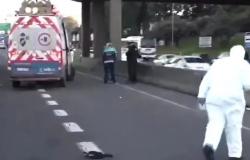Like every Saturday, dozens of women participate in the embroidery workshop at the José Domingo Cañas House of Memory, one of the 60 places of memory protected by Chilean law to remember the victims of Augusto Pinochet’s dictatorship, but the doors of the premises today are exceptionally closed. Among the attendees, who are embroidering a burlap to commemorate the 14th anniversary of the recovery of the site, the conversation revolves around the serious financing crisis that affects a part of the spaces like this one.
The Government of Gabriel Boric has been in debt for four months for the resources committed to the Sites of Memory Program (PSM) that began in 2023, which has left 13 memorials in the country in the lurch. In addition, the Executive announced that it will change the method of delivery of the funds, which will now be awarded through competition and not directly, as until now. “As workers we have faced conditions of instability, insecurity, uncertainty and the lack of funding from the State,” the affected sites noted in a statement.
“These places have a very important value for our society, they are alerts to remember what happened, so that it never happens again. I can’t understand that they could be lost,” Cecilia Ramírez, 55, one of the attendees at the embroidery workshop, tells ElDiario.es. Her partner and contemporary Sol Queupil, who has a father-in-law detained and disappeared by the dictatorship, remembers the importance of “not losing memory” at a time of “the rise of denialism.”
With no alternative but to close
Four people work at the José Domingo Cañas Memory House, a former detention and torture center that today bears the name of the street where it is located, near the center of the capital, a couple of interns and several volunteers. “Last year we were a stable team of eight, but half had to be fired due to insecurity of resources,” explains Paulina Acevedo, in charge of the Education area.
Other spaces could not resist economic abandonment and had to temporarily close their doors, such as the Neltume Museum, in the Los Ríos Region, in the south of the country, dedicated to protecting the memory of the resistance to the dictatorship and the victims it left behind. that territory.
“By not having any other type of financing, an entire work team is left without salaries and the space is left without the possibility of continuing to operate, so there is no alternative but to close doors,” says the president of Neltume, Angélica Navarrete.
“For the entire network of memory sites, this situation is a very hard blow that not only puts the viability of the affected institutions at stake, but also sends a message that this is an issue that does not interest either this Government or the society as a whole,” says Claudio Nash, coordinator of the Human Rights Chair at the University of Chile.
Javiera Bustamante, researcher in Historical Memory at the Alberto Hurtado University, emphasizes that “they are already fragile and vulnerable sites, both in their materiality and in terms of their management capabilities, in human and economic resources” and recalls that the 13 Affected memorials were selected by the PSM for being “at obvious risk of deterioration, disappearance, affectation and grievances.”
Navarrete regrets that there is no law that protects financing for memory sites “continuously and independently of the Government that takes office,” to avoid the “fight every year over the budget.”
Compete for scarce resources
Until before 2023, when the PSM was implemented, memory sites survived as best they could, “between raffles, fundraising events and personal contributions,” although some also received (more limited) resources for specific projects, explains Ana Becerra, president of the foundation in charge of the Rocas de Santo Domingo site, a popular coastal residential complex during the Government of Salvador Allende later converted into a torture center by the regime.
In his first public account as president, in June 2022, Boric committed to “recover and revalue” the places of memory, but his commitment lasted a year. In 2024, its financing has been postponed and, after the last meetings, the Memory Sites Program, linked to the Ministry of Culture, promised that the resources will arrive in May, but without retroactivity. “It does not resolve our situation, because we do not know what is going to happen in these previous three months,” criticizes Acevedo. “In addition, if the funds are competitive it will force us to compete among ourselves, which is very perverse,” he adds.
“It is approaching an act of betrayal”
The affected memorial workers say they feel “sadness, anger and disappointment,” in addition to considering “a lack of respect for memory and missing people,” in the words of Paulina Acevedo.
Claudio Nash considers “inconceivable” the “indolent” attitude of a Government made up of parties that suffered repression and that always spoke of human rights as an essential part of its agenda. For him, what happened “is closer to an act of betrayal than to an act of sloppiness or abandonment.”
Workers in the sector have shown their support in public and, at an international level, the Network of Latin American and Caribbean Sites of Memory (RESLAC) and the International Coalition of Sites of Conscience, which brings together more than 370 sites in more than 70 countries, called on the Chilean government to “offer an immediate solution” to the affected places.
Beyond the solutions that the Executive offers in the short term, anthropologist Bustamante believes that this crisis “demonstrates the historical debt (of the State) with memory policies in Chile and the pending tasks in truth, justice and reparation.”
Convinced that the José Domingo Cañas Memory House will “resist” this impasse, Paulina Acevedo summarizes it like this: “It is the State that has the ethical and moral obligation to maintain these sites because it was the one that violated the human rights of thousands of people”.






